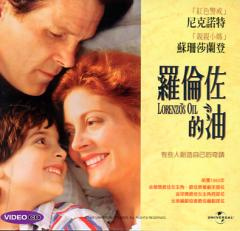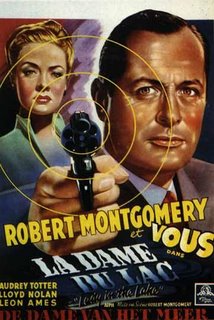Screening Diary: Week of 5 Nov 06
To Jon Rosenberg, who suggested I'd given up on this feature mid-first post: you're about to have a plate with some words on it and a knife and a fork.
 Lorenzo’s Oil (1992, George Miller) [A-]
Lorenzo’s Oil (1992, George Miller) [A-]Bilge Ebiri, over at The ScreenGrab, called this the most underrated movie of the ‘90s. Funny, because I thought that was Babe: Pig in the City, also directed by George Miller. But I digress -- this is strong stuff, not just rejimmying the disease-of-the-week movie, but the pompous-Oscar-bait movie as well. Miller’s showy, to be sure: the camera’s always moving, wide-angle lenses are frequently strapped on, and the early shot of Nick Nolte flopping around like a washed-up fish on a staircase upon discovering the grim details of his young son’s rare and fatal disease is among the most over-the-top images ever left in a final cut. But he’s also thoughtful. The moment where care may have turned into cruelty comes around the hour mark, leaving plenty of time for the viewer to marinate on the ethical debate. Things turn out for the better (if not the best -- 14 years later, Lorenzo is still in about the same place, mentally), but that doesn’t let Nolte and mom Susan Sarandon off the hook for, among other things, ridding themselves of family members, fellow parents of kids with the same disease, and a revolving door cast of increasingly freaked nurses. (There’s also a scene where Nolte tries to wrestle with the notion of arrogance, and how it’s sometimes necessary.) Better than anything is that it doesn’t disguise its triumph in spirituality or divine intervention, but in the people themselves; there’s a part where Nolte chides Sarandon of turning her back on God, but the film makes no attempt to suggest that her resilience has to do with anything but her own inner strength. Special note: late in, Sarandon does a bit of oh-so-cinematic minimal crying, and I swear she actually manages to allow two drops to fall from both eyes at the same time. Now, that’s acting!
 Lady in the Lake (1947, Robert Montgomery) [C]
Lady in the Lake (1947, Robert Montgomery) [C]There’s a ten-minute section in the second hour involving a car crash and a nighttime crawl when Robert Montgomery’s subjective-camera gimmick works gangbusters. Otherwise, it doesn’t at all. To those who’ve never heard of this film, what this is is Chandler’s titular novel shot entirely, save for a couple direct-address interludes/how’s-it-going’s, with POV shots. I.e., actors look right at the camera, cigarette smoke constantly wafts in the foreground, punches and slaps are given from off-screen and received by the lens, etc. Pretty innovative, no? Then why haven’t you (most likely) heard of it? Why is no one mentioning Montgomery in the same breath as Charles Laughton as actors-who-sadly-only-directed-once? (Not to mention Orson Welles, who at one point planned his debut as a subjective-camera movie.) Possibly because it bombed and earned a reputation as a giggle-inducing failure. Warner Bros. included it in their latest Film Noir comp set, suggesting a reassessment was a-transpirin'. But it turns out, no, it’s pretty much a total failure after all. For one thing, Raymond Chandler’s books (and the other movies based on them) are already plenty subjective. The idea that “You and Robert Montgomery solve a murder mystery together!” (as per the poster) would still hold up even if Montgomery was in front of the lens. As md’a would put it, it’s like a hat on top of a hat. (Incidentally, it’s almost tempting to think that Montgomery realized what a bland Marlowe he would make, and then came up with the gimmick. He certainly sounds like he’s doing a Bogie impersonation, and a bad one at that.) For another, not only does the camera suggest the stiffest of movements, both in the body and the eyes, but it encourages it in those in front of the camera, too. Put simply, there has never been this much eye contact on the planet ever. That said, Audrey Totter, as the potential femme fatale, almost makes it work in two ways: 1) she seems to be in on how absurd it is, and finds the right hammy tone, which most notably manifests itself in sporadically bulging eyes; and 2) by never ever ever ever breaking eye contact, Totter takes the notion of trust to its breaking point, as who can keep up a ruse without averting their eyes? (As we learned in The Negotiator, looking up is a classic giveaway.) In any case, the nicest thing you can say is that whatever’s involving about it has to do with the source -- surely not what one’s going for when trying to revolutionize cinema.
Looking For Comedy in the Muslim World (2006, Albert Brooks) [B-]
Starts out in the same self-pitying vein of The Muse before turning into the most scabrous assault on the Albert Brooks persona since Lost in America. Hooray! If only it was better directed (the flat style, which Dave Kehr has in the past not insanely compared to Ozu, only serves to give a formlessness to some of the scenes, most devastatingly the central stand-up bit) and didn’t devolve into International Incident that’s unfortuntately too little, too late. Brooks, who plays “himself” (see: Larry David), is in his late-middle age closer to a geriatric, forever whining about trivial matters, sometimes in front of picturesque landmarks. But the portrait of American isolationism was already devastating before the third act. That's Ed, I really can't carp; at least it's funny...
 Zathura (2005, Jon Favreau) [B]
Zathura (2005, Jon Favreau) [B]Methinks the brother angle is overplayed, while the sis one is egregiously underplayed, leaving her asleep or frozen for the first hour before whipping out a bizarrely unremarked-upon incest angle. On the other hand, as my brilliant colleague Sean Burns noted: there are actual dudes in actual freaking lizard costumes! Awesome! The retro, tactile approach compensates mucho, as does the general simplicity of the whole thing: as predicted with Favreau at the helm, there’s none of the fat of (what I’ve seen of) Jumanji, and he coaxes relaxed from both its kids and adults, namely Tim Robbins and Dax Sheppard. Speaking of which, how amazing is it that a modestly-budgeted, studio fantasy film that’s both a sequel to a blockbuster and one filmmaker’s follow-up to another monster hit (i.e., Elf) boasts a total of five cast members. (If you don’t count a handful in lizard suits. Or Frank Oz, who voices the robot.) Also, can anyone provide me with the philosopher or quantum physicist or whomthefuckever is responsible for that leftfield third act plot twist? My mind was actually and genuinely blown. Would make a nice double feature with Monster House.
[Seen for Da Weekly: Alpha Dog (2006, Nick Cassavetes) [C-]; Yolda (2005, Erden Kiral) [C+]; My Man Godfrey (1936, Gregory La Cava) [B+]; Happy Feet (2006, George Miller) [B- -- seriously].]
Next week: Why Babel blows!!


0 Comments:
<< Home